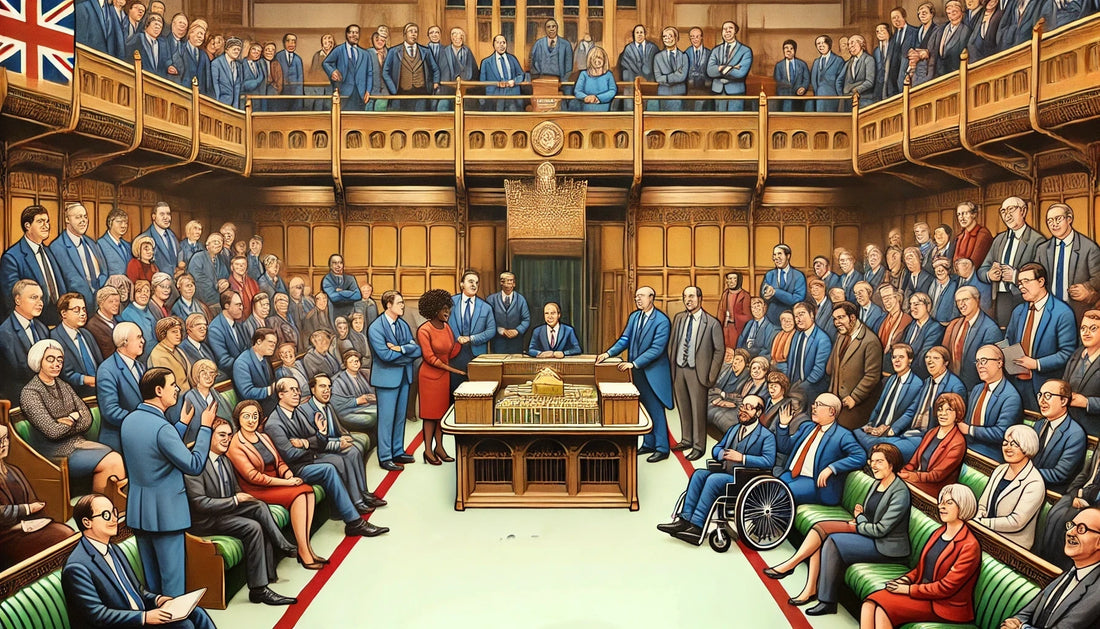
Addressing Ableism in Parliament: A Call for Inclusive Debate and Respect
Share
In the wake of Labour’s recent landslide victory in the General Election, a pressing call for change has emerged within the halls of the UK Parliament. As MPs return to their duties, there’s a growing demand to address the pervasive issue of ableism and foster a more inclusive environment for political discourse.
The Current Situation
Ms. Gill Rudd, a speech and language expert at Birmingham City University (BCU) and trustee of the British Stammering Association, is leading the charge for change. She’s urging MPs to “cut out the mocking and jeering” that has become all too common in parliamentary debates, particularly when it comes to colleagues with communication difficulties.
“I’m calling for an end to the mocking and jeering which adds nothing to the conversation, and only serves to demean others,” said Ms. Rudd. “We need arguments to be focused on their substance, not their delivery. We need debates to be robust but professionally managed.”
Recent incidents have highlighted the urgency of this issue:
-
Former Prime Minister Rishi Sunak faced criticism for mocking Sir Keir Starmer’s stutter during a session of Prime Minister’s Questions.
-
Earlier in 2024, a former politician from Northamptonshire withdrew as a parliamentary candidate for the Liberal Democrats after receiving abusive comments about his stammer from political contemporaries.
These events underscore the persistent challenges faced by individuals with communication difficulties in the political arena.
A Commitment to Change
Encouragingly, the recent King’s Speech included a commitment to encouraging “wide participation in the democratic process” and “driving up standards” in the Commons. This aligns with Ms. Rudd’s call for elected representatives to commit to accessible communication and work towards creating an environment where differences are respected and celebrated.
“That’s very encouraging and a timely message. Our elected representatives need to commit to accessible communication and work towards creating an environment where differences are respected and celebrated.”
Ms Rudd is also urging the media to correctly portray people with communication difficulties following claims that their stammers or stutters are edited out of interviews or had links dropped.
“We need to ensure we are hearing all voices, recognising and uplifting the voices that have previous been undervalued and excluded,” said Ms Rudd.
Expanding the Scope
While the initial call focuses on parliamentary behavior, addressing ableism in politics requires a more comprehensive approach. Here are some key areas that need attention:
-
Representation: According to the UK Government, approximately one in five people in the UK have a disability. However, this demographic remains significantly underrepresented in politics. Increasing the number of disabled MPs and staff members is crucial for ensuring diverse perspectives in policymaking.
-
Accessibility: The House of Commons and the Scottish Parliament have launched initiatives aimed at increasing disabled people’s access to Parliament. However, more needs to be done to ensure physical, digital, and procedural accessibility.
-
Legal Framework: The Equality Act 2010 prohibits political parties from discriminating against disabled members or candidates. However, implementation and enforcement of these protections need to be strengthened.
-
Financial Support: The Access to Elected Office for Disabled People Fund and similar initiatives provide financial support to disabled candidates. Expanding and sustaining these programs is essential for reducing financial barriers to political participation.
-
Cultural Change: Beyond rule changes, there’s a need for a fundamental shift in parliamentary culture. This includes fostering respect, empathy, and understanding among all members, regardless of their abilities or communication styles.
-
Media Representation: Ms. Rudd also calls on the media to accurately portray people with communication difficulties, highlighting concerns about editing out stammers or stutters from interviews.
Moving Forward
To address these issues comprehensively, several steps can be taken:
-
Mandatory Training: Implement comprehensive disability awareness training for all MPs and parliamentary staff.
-
Clear Guidelines: Develop and enforce strict guidelines against ableist behavior during debates, with clear consequences for violations.
-
Assistive Technologies: Invest in state-of-the-art assistive technologies to support MPs with various disabilities during debates and other parliamentary activities.
-
Mentorship Programs: Create targeted programs to support disabled individuals in pursuing political careers, including mentorship and financial support.
-
Media Collaboration: Work closely with media organizations to ensure fair and inclusive coverage of parliamentary proceedings and disabled MPs.
-
Regular Audits: Conduct frequent assessments of parliamentary practices and culture to identify areas for improvement and track progress.
By taking these steps, the UK Parliament can lead by example in creating a truly inclusive political environment. This not only benefits disabled individuals but enriches the democratic process by ensuring diverse perspectives are represented and valued.
As we move forward, it’s crucial to remember that addressing ableism and fostering inclusivity is an ongoing process. It requires continuous effort, open dialogue, and a commitment to change from all levels of government and society.
House of Commons Inclusion and Diversity Strategy 2023-2027
